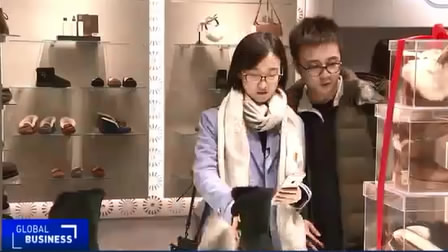
Business
10:50, 14-Jan-2017
China's online spending growing 7 times faster than the US
Updated
10:34, 28-Jun-2018

Written by CGTN reporter Han Peng
China's e-commerce giant Alibaba says an average Chinese Alipay user born in the 1980s spent more than 120,000 yuan, or US 17,000 dollars, in 2016 through their app. Such spending is well above the average income in China, which was around 80,000 yuan, or 11,000 US dollars in 2015, according to the government.

CFP Photo
CFP Photo
In another report, online sales of consumer goods in China grew at an average of nearly 80 percent from 2010 to 2015, far outstripping a growth rate of 10 percent in the US and an 8 percent rise in the UK, according to OC&C Strategy Consultants.
The total amount of online sales in China hit 25 billion US dollars in 2015, more than the US and UK combined.
Again, most of the purchases were made by millennials – the young generation born after the 1980s.
What are they buying? Why are they spending so much? And can they afford their spending sprees?
CGTN's Han Peng spoke to some youngsters in Beijing in an attempt to find out more.

Fun quotes from the interview:
Reporter: “If I might ask, how much money do you spend each time?”
Li: “I don't have a definite number. When I feel under big pressure, I spend a lot of money to buy clothing, skincare products, things like that.”

CGTN Photo
CGTN Photo
Reporter: “Do you earn enough money to support your demand?”
Li: “No... If I don't have enough money, I'll pay by credit card. So each month when the credit card bill comes, I'm always very worried.”

CGTN Photo
CGTN Photo
It seems that they have little clue as to where their money has gone.
A data analysis team of China's leading e-commerce retailer Alibaba says they keep track of where the money is being spent better than the millennials who are spending it.
“Many millennials have felt this surge in their purchasing power during their transition from student to white collar worker. They hope to buy expensive things that until now they could only dream about but couldn't afford. They are starting their families, and many hope the goods they put in their new homes, like furniture or baby products, will create a better lifestyle," says Yang Qin, chief data analysis of CBN New Media team.
A China Business News Weekly report cited an online survey, which shows that most new graduates earn about 5,000 yuan, or 725 US dollars, a month, but they would often have a monthly spend of two to three thousand yuan on unnecessary items.
Here are some posts from Weibo about spending habits:
I graduated half a year ago. I earn 4000-6000 yuan (580-870 US dollars) per month. This past year I have bought a 2,300 yuan (333 US dollars) Bose speaker, 1,800 yuan (261 US dollars) Bose headset and a 1,200 yuan (174 US dollars) electric toothbrush.
- @请望向xx
I graduated half a year ago. I earn 4000-6000 yuan per month. I just bought a 5,000 (725 US dollars)yuan shaver.
- @sandyxx
I graduated two years ago, earning a little over 6000 yuan per month. I just went to a private dentist. I don't want to queue up, I just want to enjoy the service with ease.
- @huangyunxx
As for whether they can afford such spending sprees, the short answer is – it varies from person to person.
Some millennials may simply earn more than the average. Some pay by credit card, while some spend money on what they WANT to buy and then depend on their parents to help out on what they NEED to buy, such as an apartment.
Chinese people have a tradition of saving their money to prepare for bad times ahead, a way of thinking that stems from the food shortages suffered in the country just 40 years ago.
But for millennials, their parents' way of spending is an outdated one. This younger generation seems to have shifted the focus of consumer spending from not just survival but to quality of life.
For business owners, it's time to adjust to this new and rising demand in a nation that continues to change at a rapid pace.
7km

SITEMAP
Copyright © 2018 CGTN. Beijing ICP prepared NO.16065310-3
Copyright © 2018 CGTN. Beijing ICP prepared NO.16065310-3